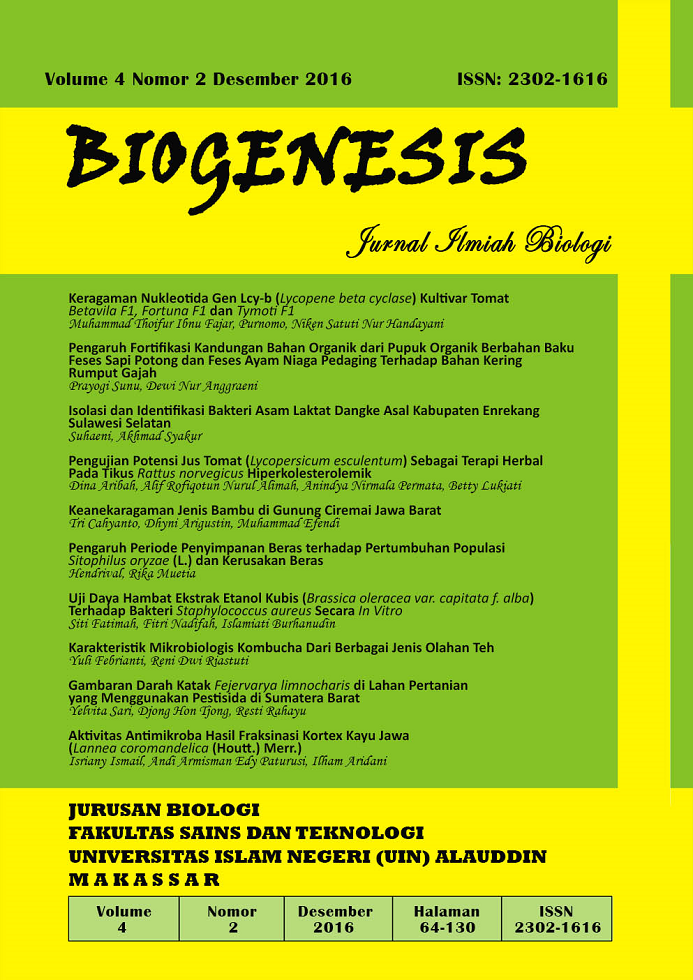Pengaruh Fortifikasi Kandungan Bahan Organik dari Pupuk Organik Berbahan Baku Feses Sapi Potong dan Feses Ayam Niaga Pedaging Terhadap Bahan Kering Rumput Gajah
Abstract
Fortification effects of beef cattle feces with broiler chicken feces on dry matter of elephant grass was carried in the Industrial Area of Superior manure Compost, village district of Mipiran, Padamara, Purbalingga, and Experimental Farm, Faculty of Animal Science of Jenderal Soedirman University and Soil Science Laboratory of the Faculty of Agriculture, Sebelas Maret University Surakarta. This study was aim to determine the effect of commercial broiler chicken feces as the substitute for feces of beef cattle from the aspect of organic matter content and to determine the effect of fertilizer dry matter productions of elephant grass.
The materials used were the feces of beef cattle as much as 930 kg, the commercial broiler chicken feces, 270 kg and 2.4 lt EM4. This research method used Completely Randomized Design (CRD) with four treatments (R), namely: R0: 100% beef cattle feces (50 kg), R1: 85% of beef cattle feces (42,5 kg) of commercial broiler chicken feces + 15% (7,5 kg), R2: 70% of beef cattle feces (35 kg) of commercial broiler chicken feces + 30% (15 kg), R3: 55% of beef cattle feces (27,5 kg) of commercial broiler chicken feces + 45 ( 22,5 kg) with six replications.
The results showed that the averages of organic matter content of R0, R1, R2, and R3 were 43,071%, 34,075%, 27,815%, and 36,098% respectively. The result of analysis of variance showed that the averages of organic matter that did not use commercial broiler chicken feces (R0) was higher than using commercial broiler chicken feces.
The results of analysis showed that administration of compost on the grass did not affect significantly (P>0,05) on fresh production of elephant grass, presumably because it had not decomposed completely. Compost nutrient content was low, therefore, was not sufficient to provide additional nutrients needed by the plantsCopyright (c) 1970 Prayogi Sunu, Dewi Nur Anggraeni

This work is licensed under a Creative Commons Attribution 4.0 International License.
COPYRIGHT AND LICENSE STATEMENT
COPYRIGHT
Biogenesis: Jurnal Ilmiah Biologi is published under the terms of the Creative Commons Attribution license. Authors hold the copyright and retain publishing rights without restriction to their work. Users may read, download, copy, distribute, and print the work in any medium, provided the original work is properly cited.
LICENSE TO PUBLISH
1. License
The use of the article will be governed by the Creative Commons Attribution license as currently displayed on http://creativecommons.org/licenses/by/4.0.
2. Author’s Warranties
The author warrants that the article is original, written by stated author/s, has not been published before, contains no unlawful statements, does not infringe the rights of others, is subject to copyright that is vested exclusively in the author and free of any third party rights, and that any necessary written permissions to quote from other sources have been obtained by the author(s).
3. User Rights
Under the Creative Commons Attribution license, the users are free to download, reuse, reprint, modify, distribute and/or copy the content for any purpose, even commercially, as long as the original authors and source are cited. No permission is required from the authors or the publishers.
4. Co-Authorship
If the article was prepared jointly with other authors, the corresponding author warrants that he/she has been authorized by all co-authors, and agrees to inform his/her co-authors of the terms of this statement.
5. Miscellaneous
Biogenesis: Jurnal Ilmiah Biologi may conform the article to a style of punctuation, spelling, capitalization, and usage that it deems appropriate. The author acknowledges that the article may be published so that it will be publicly accessible and such access will be free of charge for the readers.


